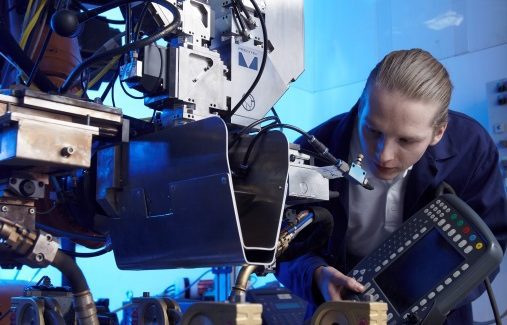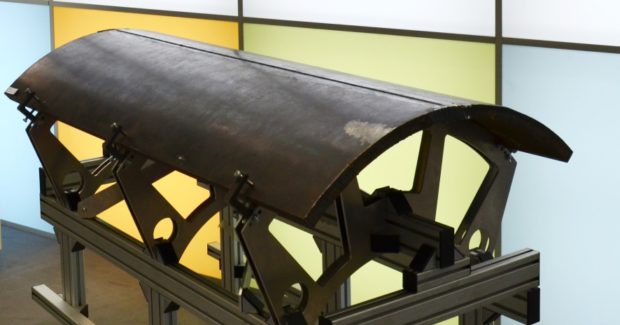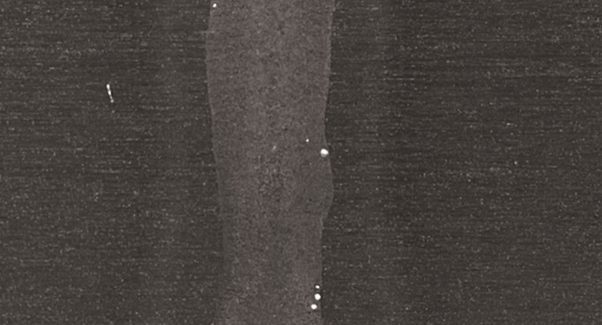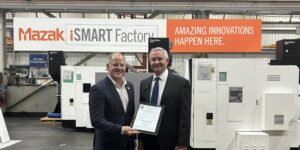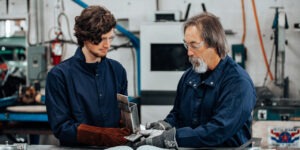Welding Thick Metal Sheets Quickly
It is possible to weld thick pipelines and metal sheets made of aluminum alloys or steel at high speeds with a hybrid welding process developed at Laser Zentrum Hannover. In the future, this laser-based process can be used to shorten processing times and significantly reduce the processing costs of liquid gas tanks and pipelines.
Posted: August 5, 2014
Scientists of the Joining and Cutting of Metals Group at the Laser Zentrum Hannover e.V. (LZH, Germany) have developed a process that can be used to make single-sided, zero-defect welds for aluminum sheets up to a thickness of 12 mm.
To do so, they have combined a laser beam with two gas metal arc welding (GMAW) torches. A scanner mirror can be used to oscillate the laser beam lengthwise or crosswise to the feed direction. The joining process can reach feed speeds of 5 to 6 m/min, and gaps of up to 0.5 mm and edge misalignment of up to 2 mm can be bridged. The engineers have also been able to weld steel sheets with a thickness up to 23 mm at a speed of 1.5 m/mm for single layer welds.
PERFECT WELDING SEAM
The innovative process is not only extremely fast: In comparison to conventional methods with multiple layer gas metal arc welding processes, the seam geometry is very narrow and filler material consumption is considerably lower. At the same time, the quality of the weld seam is very good: Welds for 12 mm thick metal sheets made of the aluminum alloy EN AW 6082 T6 could reach the highest evaluation group B for welding seam impurities according to DIN EN ISO 12932 and DIN EN ISO 13919 2.
In comparison to conventional processes, a further advantage of the combined processes is reduced thermal input, and thus reduced component distortion. A solid-state disk laser with an output power of 16 kW is used for the hybrid welding process.
TWELVE TIMES FASTER THAN GMAW
In order to join steel sheets with a thickness of 30 mm, conventional gas metal arc welding requires a tack weld and around six filler layers. The hybrid process only needs two to three filler layers. The first layer is made using the laser-GMAW hybrid process. It also replaces the tack welds and the first four layers of the conventional gas metal arc weld. Subsequently the sheets are subject to one or two backing runs with the GMAW process. Thus, the hybrid welding process can be used to weld a component with a length of 1.5 m in one minute, whereas conventional processes need twelve minutes.
A demonstration of the latest hybrid welding technology.
COMBINING ADVANTAGES AND COMPENSATING DISADVANTAGES
The main advantages of hybrid welding are the synergy effects between the arc of the GMAW process and the laser beam. In the combined process, the laser is coupled into the melt pool of the filler material of the GMAW process: The filler material is melted by the arc and in the molten state it absorbs the energy of the laser beam and transfers the energy to the weld area between the sheets. The laser beam and the arc process stabilize each other, making relatively high welding speeds for arc processes possible and for high gap widths.
In the HYBRILAS joint project, “Welding of thick metal sheets using brilliant laser beam sources,” was part of the MABRILAS initiative for “Material processing with brilliant laser beam sources” and was financially supported by the German Federal Ministry of Education and Research (BMBF), and supported by the Association of German Engineers (VDI-TZ).
As an independent, non-profit research institute, the Laser Zentrum Hannover e.V. (LZH) stands for innovative research, development and consulting. The LZH is supported by the Lower Saxony Ministry for Economics, Labour and Transport and is dedicated to the selfless promotion of applied research in the field of photonics and laser technology. Founded in 1986, over 170 staff have achieved a turnover of 15.993 million euros (for 2013), among others, from income from federal, state, EU and industrial projects.
The focus of the LZH lies on the fields of optical components and systems, optical production technologies, and biomedical photonics.
Interdisciplinary cooperation between natural scientists and mechanical engineers makes innovative approaches to challenges from the most different areas possible: from the development of components for specific laser systems to process developments for the most diverse laser applications, for example for medical technology or lightweight construction in the automotive sector. Seventeen spin off companies have emerged from the LZH up to now. Thus, the LZH has created a strong transfer between fundamental science, application oriented research, and industry.
Laser Zentrum Hannover e.V., Hollerithallee 8, 30419 Hannover, Germany
+49 511 27880, www.lzh.de.





